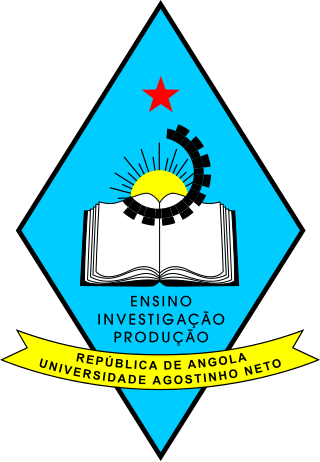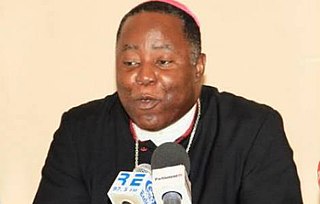Contents
This article needs additional citations for verification .(March 2013) |
This is a list of notable universities in Angola.
This article needs additional citations for verification .(March 2013) |
This is a list of notable universities in Angola.
The Angolan football Cup is the main "knockout" cup competition in Angolan football.

The Agostinho Neto University is the largest public university of Angola, based in Luanda and in the nearby city of Talatona, in Angola. In the academic year 2005–06, 68 licensing courses were ministered by the university: 18 in Bachelor's and 15 in master's degrees, involving areas of scientific knowledge in the faculties, institutes, and higher learning schools. It is one of seven public universities in Angola. Until 2009 the Agostinho Neto University was the country's only public university, and had campuses in all its major cities. In 2009 it was split up, with its campuses outside Luanda becoming six autonomous universities, located in Benguela, Cabinda, Huambo, Lubango, Malange, and Uíge. Agostinho Neto University is now one of the seven regional university among others, serving Luanda Province and Bengo Province. It remains the largest university in Angola.

The 2010 Africa Cup of Nations, also known as the Orange Africa Cup of Nations for sponsorship reasons, was the 27th Africa Cup of Nations, the biennial football championship of Africa (CAF). It was held in Angola, where it began on 10 January 2010 and concluded on 31 January.

Rail transport in Angola consists of three separate Cape gauge lines that do not connect: the northern Luanda Railway, the central Benguela Railway, and the southern Moçâmedes Railway. The lines each connect the Atlantic coast to the interior of the country. A fourth system once linked Gunza and Gabala but is no longer operational.

Football is the most popular sport in Angola, The national team (m) qualified for the 2006 FIFA World Cup in Germany and many Angolan footballers play internationally, particularly in Portugal and France.
The colonial history of Angola is usually considered to run from the appearance of the Portuguese under Diogo Cão in 1482 (Congo) or 1484 until the independence of Angola in November 1975. Settlement did not begin until Novais's establishment of São Paulo de Loanda (Luanda) in 1575, however, and the Portuguese government only formally incorporated Angola as a colony in 1655 or on May 12, 1886.

The following outline is provided as an overview of and topical guide to Angola:

Education in Angola has six years of compulsory education, under the Angolan Education Law (13/01) of 31 December 2001. Basic adult literacy continues to be low, but there are conflicting figures from government and other sources. It is difficult to assess literacy and education needs. According to 2015 estimates, the literacy rate in Angola is 71.1% . On the other hand, the university system has been developing considerably over the last decade.

Televisão Pública de Angola E.P. or TPA is the national broadcaster of the Southern African state of Angola. It operates two generalist television channels and a news channel. TPA is headquartered in the capital city Luanda and broadcasts in the Portuguese language.

In southwestern Africa, Portuguese Angola was a historical colony of the Portuguese Empire (1575–1951), the overseas province Portuguese West Africa of Estado Novo Portugal (1951–1972), and the State of Angola of the Portuguese Empire (1972–1975). It became the independent People's Republic of Angola in 1975.
Paulino Fernandes Madeca was a Catholic Bishop of Cabinda.
The 2014 Taça de Angola was the 33rd edition of the Taça de Angola, the second most important and the top knock-out football club competition in Angola, following the Girabola. Benfica de Luanda beat defending champions Petro de Luanda 1–0 in the final to secure its first title.
The 2012 Angola Cup was the 31st edition of what is considered the second most important football club competition in Angola, following the Girabola. Petro de Luanda beat Rec da Caála 1–0 in the final to secure its 9th title.
The following is a timeline of the history of the city of Benguela, Angola.

Filomeno do Nascimento Vieira Dias is an Angolan prelate of the Catholic Church who has been Archbishop of Luanda since 2015; he was an auxiliary bishop there from 2003 to 2005. He was Bishop of Cabinda from 2005 to 2014, where his lack of identification with the province and its separatist movement initially made his appointment controversial and he was only installed after sixteen months.

The Port of Lobito is an Angolan port located in the city of Lobito, in the province of Benguela. It is connected to the commercial area of the city and the neighborhood of Canata. It is located in Lobito Bay, which is separated from the Atlantic Ocean by the Lobito Peninsula.

The port of Luanda is an Angolan port located in the city of Luanda, the national capital, in the province of Luanda. It is connected to the city center of Luanda and the district of Ingombota. It is located in the Luanda Bay, which is separated from the Atlantic Ocean by the island of Luanda.
The 2020–21 Taça de Angola was the 39th edition of the Taça de Angola, the second most important and the top knock-out football club competition in Angola following the Girabola.